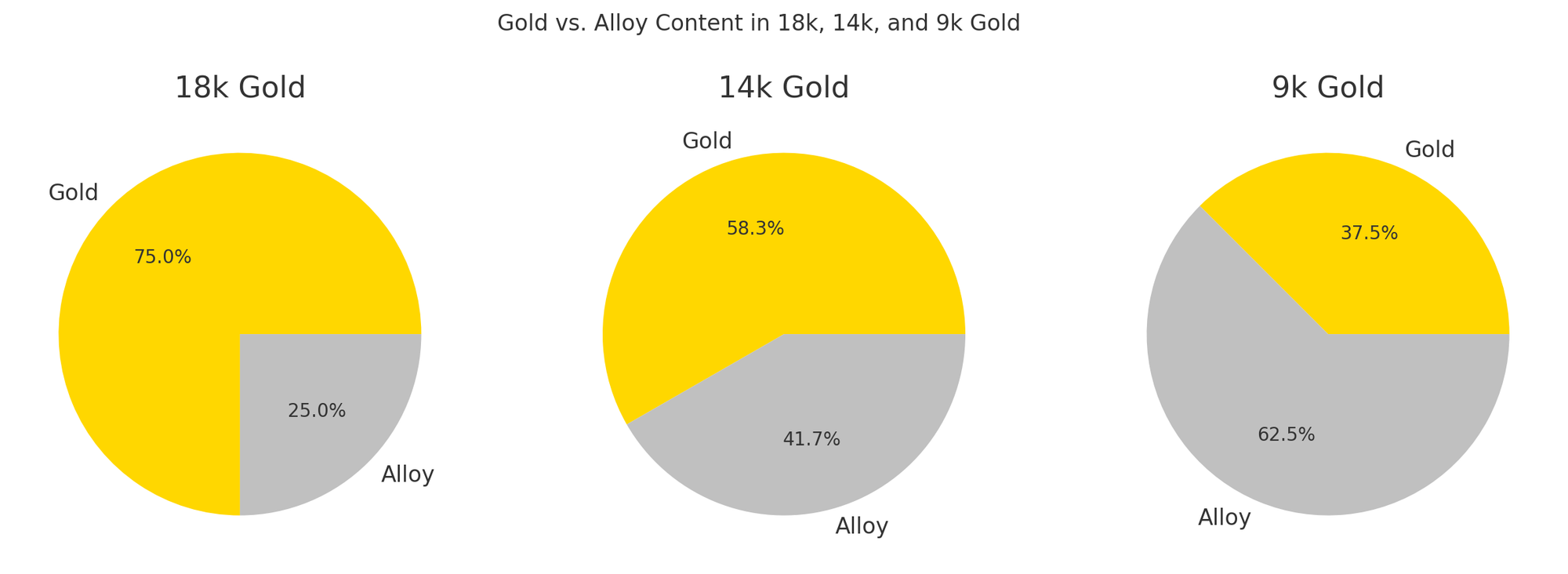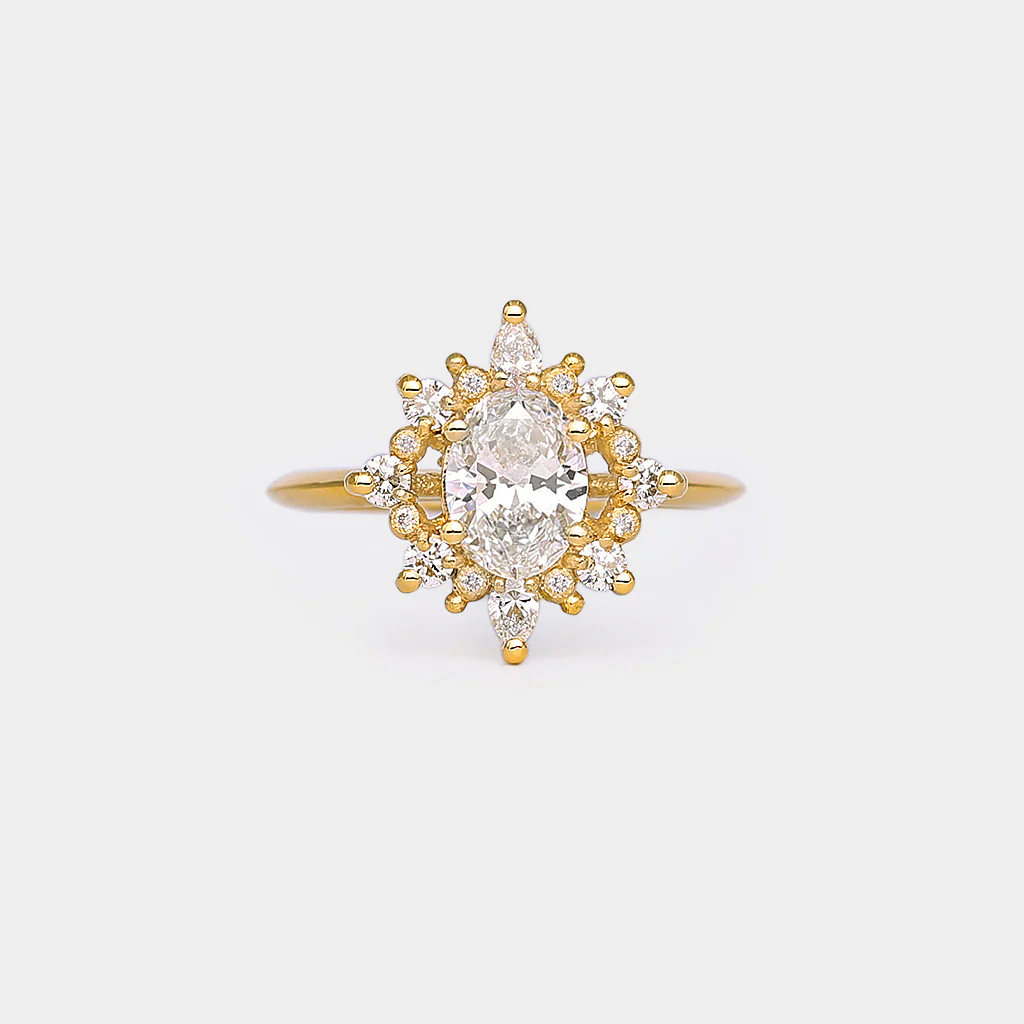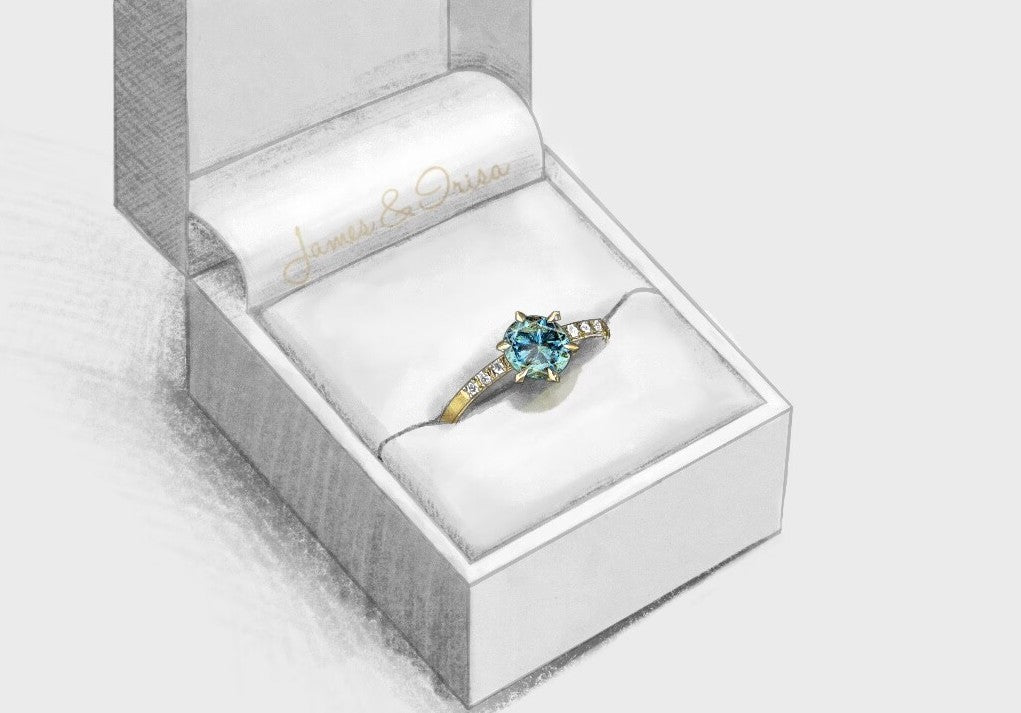Choosing Between 18k, 14k, and 9k Gold for Your Jewellery: A Complete Guide
When choosing gold for jewelry, it’s important to understand the differences between 18k, 14k, and 9k gold to help you select the perfect option. Each type of gold has unique qualities in appearance, durability, and price, making it essential to know which one aligns best with your lifestyle and jewelry needs. Whether you’re looking for engagement rings, wedding bands, or fine jewelry pieces, here’s a comprehensive guide to finding the right gold for your jewelry.
What is 18k Gold?
18k gold is a high-purity gold commonly used in luxurious and fine jewellery. With 75% pure gold and 25% alloyed metals, 18k gold has a rich color and high luster that make it ideal for high-quality pieces such as engagement rings, wedding bands, and other elegant fine jewellery. Its softness, however, means that it’s more delicate and may be better suited for occasional wear or jewelry items handled with care.
Advantages of 18k Gold:
- Luxurious Appearance: The high gold content gives 18k gold its deep, radiant hue, often preferred in high-end jewelry.
- Hypoallergenic Properties: With fewer alloyed metals, 18k gold is less likely to cause skin sensitivities, making it a popular choice for those with sensitive skin.
Considerations for 18k Gold:
Due to its softness, 18k gold may be more prone to scratching or bending, making it less suitable for daily wear compared to lower karats. It is also generally more expensive, reflecting its higher gold content.
What is 14k Gold?
14k gold strikes a balance between durability, affordability, and beauty, containing 58.3% pure gold and 41.7% alloyed metals. This blend of strength and beauty makes 14k gold a popular choice for engagement rings, wedding bands, and jewellery intended for daily wear. The slightly muted color compared to 18k gold still offers an elegant appearance while standing up to more frequent use.
Advantages of 14k Gold:
- Increased Durability: 14k gold is more resistant to scratches and dents, making it a practical choice for everyday jewellery, including engagement rings and wedding bands.
- Balanced Price: More affordable than 18k gold, 14k gold allows for a balance of high quality without a premium price tag.
Considerations for 14k Gold:
While 14k gold may not have the same richness in color as 18k gold, its durability makes it an excellent choice for those looking for long-lasting, beautiful jewellery they can wear daily.

What is 9k Gold?
9k gold is the most durable and affordable option, containing 37.5% pure gold and 62.5% alloyed metals. With a paler color than 14k and 18k gold, 9k gold is often chosen for its durability and strength, making it perfect for jewellery pieces that endure frequent wear and tear. Its composition also makes it more affordable, allowing you to enjoy gold jewelry within a more modest budget.
Advantages of 9k Gold:
- Highest Durability: The added alloyed metals make 9k gold resistant to damage, ideal for jewellery worn daily, like simple rings and everyday necklaces.
- Cost-Effective: 9k gold is an accessible option for those who want the appeal of gold without the higher cost.
Considerations for 9k Gold:
Because it has a lower gold content, 9k gold lacks the warm, rich color of 18k or 14k gold, giving it a subtler look. Some may prefer 9k gold for its affordability and durability over the higher karats’ elegance.
Factors to Consider When Choosing Gold for Jewelry
1. Durability:
When selecting gold for items you plan to wear daily, like wedding bands, durability is essential. While 18k gold is softer, 14k and 9k gold offer more resistance to wear and tear, making them suitable for daily wear.
2. Appearance:
The color of gold changes with its purity level. If you prefer a deep, rich gold color, 18k gold is an excellent choice. For those who favor a slightly lighter hue, 14k and 9k gold provide beautiful, subtler alternatives.
3. Price:
The gold content affects the price. Generally, 18k gold is the most expensive, followed by 14k, with 9k being the most affordable. Consider your budget and desired qualities in a piece to choose accordingly.
4. Suitability for Engagement Rings and Wedding Bands:
For engagement rings and wedding bands, 14k gold strikes a good balance of durability and beauty. However, if you desire a more luxurious, classic appearance, 18k gold offers unmatched elegance.
Choosing the Right Gold for Your Jewellery Needs
Selecting the right gold type depends on your lifestyle, aesthetic preferences, and budget. For those looking for jewellery pieces with a rich, traditional appearance, 18k gold offers a stunning choice. Meanwhile, 14k gold provides durability for everyday items, and 9k gold is perfect for affordable yet resilient pieces that can withstand daily wear.
FAQs:
Is 18k gold suitable for daily wear?
While 18k gold is beautiful, it’s softer than 14k and 9k gold, making it more prone to scratching with daily use. It is best reserved for special occasion pieces.
Why is 14k gold popular for wedding bands?
14k gold is durable and has an elegant appearance, making it ideal for daily wear, especially for wedding bands that need to last a lifetime.
What is the difference between 9k and 18k gold?
18k gold has a higher gold content, giving it a richer color, while 9k gold is more durable and affordable due to its lower gold content.
Choosing the best gold for your jewellery is about finding a balance between beauty, durability, and cost. If you need help deciding, feel free to contact us—we’re here to help you find the perfect piece to match your style and preferences.



